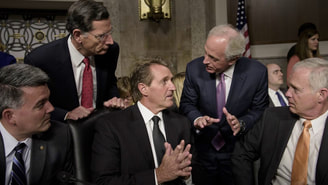|
Fathers of sons,
While your boys may like to be physical and like to wrestle and fight, please help them understand the concept of touch and of the personal boundaries of others as it relates to touch. Please help them know the difference between consensual play and physical violation – whether that’s with you, your partner, their siblings, their best friends, or strangers. Let them know now that they can say “no” and that they must listen when others say “no”. This isn’t about dating culture, it’s about the right of each of us to possess and protect our own bodies. They can and should start learning this now. Fathers of daughters, While you dote on your girls, please respect them if they say to “stop” when you playfully pat them on the bottom as they run ahead of you up the stairs, or when you tickle them in fun but it’s clear they are no longer having fun. Teach them and show them now that they are in control of their bodies and that “no means no.” Please help them learn the difference between safe and unsafe touching and remind them that they can and should always tell someone if they don’t feel safe. It doesn’t matter if the one doing the touching says they were playing or was a friend or a family member. If they don’t feel safe, they need to know to tell someone now. Fathers of sons, Please know your sons are watching how you treat others. They see how you speak to and touch your spouse. They observe how you talk with or about your Mom or Sister or Dad or Brother. They listen when you talk on the phone to people at work. They hear what you say to or about people when you yell at the driver in the car who just cut you off, or comment on the looks of the person crossing the street in front of you. In all of these, they hear the difference when you are speaking to and of a woman versus a man, and they will replicate your gender biases without ever knowing it is happening. Fathers of daughters, Your daughters will not grow up to be princesses. They will grow up to be women who live in a complex and diverse virtual and physical society. They will work and go to school in and navigate an often cruel and sexist world. Treating them as princesses and crafting a narrative that finding a mate is central to their success, that their hair is their most valuable asset, that their clothes are what make them beautiful will cripple their self-image as they get acne, as their bodies change, start successfully or unsuccessfully dating, or, god forbid, they get sick or have a terrible accident that changes their looks and bodies permanently. You must raise your girls to be strong, bold, independent, and resilient women whose sense of self is in their control and not merely the passive result of a genetic trait or financial privilege. Fathers of sons, Your boys will not be princes surrounded by admiring legions of women looking to be rescued by love, nor super heroes who will save damsels in distress. Your sons will grow up and get to work for and with women of all shapes, sizes, and backgrounds and should know how to respect them for who and what they are. They need to know that they can have heroes who are women. They need to understand that women and men are different but that that does not mean stronger or weaker, better or worse, deserving of respect or not. When your son is on the playground with a girl, don’t thoughtlessly ask if that’s his girlfriend. Let it just be his friend unless he says otherwise. Positively reinforce and model for him healthy, platonic, inter-gender relationships. Fathers of daughters, When your daughter is on the playground with a boy, don’t thoughtlessly ask if that’s her boyfriend. Let it just be her friend. You too should model healthy, platonic, inter-gender relationships and not perversely sexualize your young daughter’s budding understanding of her relationships with others. If your daughter kisses another kid or holds hands or even says she loves them, remember that those actions don’t represent mature, adult “understandings” of their meaning. My daughter told us she is “in love” with a boy in her kindergarten class, and when asked what she means by that she says he’s nice to her and they like to play together. Leave it at that! That’s all it is. Fathers of sons and fathers of daughters, Please help your boys and girls know that the genders are not pitted against each other – that they aren’t “teams” to which they either belong or don’t. Help them understand that gender is meaningless in the face of fairness, personal safety, justice, and love. Help them understand that they should stand for these higher values and defend them at all cost, that they should never be silent in the face of their transgression simply because of someone’s gender. Help them build their identities and their sense of self and others on these bigger values, and surround themselves with people who will protect and promote them too. As I wrote this, I realized that my distinctions of message were largely arbitrary between fathers-of-sons and fathers-of-daughters, but the various interpretations are important. We must all teach our children to respect their own bodies as well as others’. We must teach them to value this respect so deeply that they can’t help but speak up when they feel violated or when they see or believe others have been violated. We must overwhelm any possible sense of shame or embarrassment or isolation with a powerful sense of self, of justice, and of doing right by themselves and others. These are merely the musings of a humble and sad and troubled father of three and five year old daughters, who is trying to learn from the tragedies I read about daily and prevent the violation of the women I love; a Dad and Brother and Friend who can’t fathom the actions of these men; the Son of a sexually abused Dad who committed suicide who is scared to death of the prolonged silence of these victims.
3 Comments
 There are five key relationships that every creator needs to thrive. While these aren’t always a one-to-one match (i.e. one person, one relationship), they represent key inputs and a continuum of perspectives we all need to support, guide, and grow our creative practice. 1. Supporter Our supporters are the people whose primary investment is in us as people. Their support is unconditional. In other words, they support us whether our creative process, whatever it may be, is deemed successful or not. They keep us working when we have lost faith in ourselves. 2. Collaborator Our collaborators are those who get into the creative mix with us. This can mean literally getting their hands dirty with us, or diving in to challenge us intellectually. Our collaborators are also creators and their creative process and outcomes are directly tied to our own. 3. Critical Friend Our critical friends are deeply trusted peers. They can also be collaborators, but they often work in parallel, not directly with us. These are the people who see our work and our process most wholly and ask us the most challenging questions that push and refine our work. A critical friend could be a very different thinker or work in a different medium or discipline than we do. 4. Promoter At some point, our creative output needs to meet a market or a consumer of some sort. Our supporters, collaborators, and critical friends may tell their friends about us. Our promoters tell everyone who will listen. They step up and are bought into our creative output sufficiently to put their own name on it as an endorsement. Promoters can be developed organically, or perhaps even hired, depending on the creative context. 5. Respected Critic/Doubter This one may be less intuitive, but our critics tap a different motivation than any of the other relationships here. They may even spur spite, indignation, and a desire to prove them wrong. These may seem odd things to want in our creative lives, but they have the potential to make us better creators. So, these are not the critics we dismiss simply because we think they don’t like us. These are people whose doubt of us matters to us in some way. In fact, it can even work if we are our own biggest critic/doubter as long as that motivates us rather than neutralizes our creativity.  Recently, we have seen a handful of elected officials “step up” and speak their moral truth about the current resident of the White House and the political state of our country. Many of us have celebrated, or at least sighed in relief, as someone (other than John McCain) in the president’s party broke silence and spoke from a place of clarity, honesty, and individuality. We have been relieved and have applauded leaders who we may have never imagined applauding. I listened to Jeff Flake’s powerful speech in its entirety. I actually think I even voted for Bob Corker the second time, but have long since stopped applauding him, and instead have felt betrayed by the disappearance of his candor and individuality – even if I didn’t always agree with his position. The guy I voted for showed back up. We should all pause, however, as more people step up and lead (by retiring) and thus feel “liberated” to speak their truth. What are we actually seeing? Eventual honesty? Contextual morality? Conditional leadership? When these men are finally “liberated” from the office we elected them to, from the privilege of leading our country, THEN they are honest?! THEN they will speak truth to power? THEN their morals matter? Don’t get me wrong, I am glad some people are finally speaking up, but let’s be honest about what it tells us about them, and the offices to which they were elected. Their sense of liberation and their delayed and diluted honesty illustrate a clear lack of integrity as it relates to their elected office. Integrity is “what you do when no one is looking” as the saying goes. Integrity is “the choice between what is convenient and what is right” according to former NFL coach Tony Dungy. When people speak out only when it is convenient (after they’ve announced retirement, for example), they aren’t leading. They are convenient opportunists, moral relativists, demonstrative of the demise of social, cultural, and moral leadership, (and thus representative democracy) that leaves us with corruption, elitism, nepotism, and the perpetual belief that the ends justify the means (making money, getting elected, etc. is the top priority and will compensate for those other pesky problems like integrity). We need to step back and observe this behavior, like most anything, through the critical lens of how we would talk about it with our children. Would we tell our children: once you are no longer in Ms. Smith’s math class, or after you win the big game, then you should acknowledge that you or another was cheating? Would we tell them to get elected to class president or to any other leadership position no matter what it takes, even if it compromises their values? That they can just attempt recoup their principles once the position is successfully attained – or when they are done with it? Don’t litter if someone is looking? Help someone who needs it only if someone is looking? Do it for the reward? Do it only if it benefits you? If this sort of self-centered relativism isn’t what we want to teach our children, we should at least recognize that this is what we are modeling for them and currently applauding as leadership. If instead we want to teach them integrity, we had better start by modeling it ourselves, and then demand it of our leaders. We should not accept, much less celebrate, eventual, conditional, convenient honesty that suggests integrity was dead all along. |
Categories
All
Archives
April 2024
|

 RSS Feed
RSS Feed